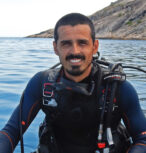DNA reveals the past and future of coral reefs
New DNA techniques are being used to understand how coral reacted to the end of the last ice age in order to better predict how they will cope with current changes to the climate. James Cook Univer

From 2005 to 2022, the main node of the ARC Centre of Excellence for Coral Reef Studies was headquartered at James Cook University in Townsville, Queensland (Australia)








Abstract: Contemporary global changes have put the capacity of future reefs to continue providing fish and fisheries production in jeopardy. Understanding future trends will require innovative and accessible strategies to measure potential fisheries production and to identify the impacts of global changes. In this talk, I will present a framework to quantify fish biomass production, aka ‘fish productivity’, from common underwater survey data and life-history traits. Applying this framework, I will then explore the trophic pathways that fuel reef fish productivity, as well as their susceptibility to coral loss and overfishing. I will use three case studies, which, in conjunct, provide evidence that: 1) plankton subsidies are important drivers of coral reef biomass production, even in reefs with low coral cover; 2) reef fish assemblages exposed to severe coral loss can undergo energetic shifts to a more productive, but potentially unsustainable, state; 3) overexploitation drives stronger declines in reef fish biomass than productivity, generating a compensatory production that may help to explain how sustained fisheries yields sometimes coincide with depleted biomass. By bridging the gap between common survey data and traditional fisheries production models, this framework can help to establish a new resource assessment paradigm on coral reefs.
Biography: Renato is an ecologist interested in understanding what makes some ecosystems more productive than others, with a focus on reefs and their fishes. Renato did his BSc in Biology and MSc in Ecology in Brazil and moved to JCU in 2016 to undertake his PhD under Dave Bellwood’s supervision. During his PhD he formalised an approach to quantify fish production from underwater count data, which he applied to tackle ecological and fisheries-related questions. In 2020 he started a post-doc at the Reef Function Hub and CoE CRS, investigating the contrasting effects of fishing on coral reef fish biomass and productivity.
New DNA techniques are being used to understand how coral reacted to the end of the last ice age in order to better predict how they will cope with current changes to the climate. James Cook Univer
A new study on the effects of climate change in five tropical countries has found fisheries are in more trouble than agriculture, and poor people are in the most danger. Distinguished Profess
James Cook University researchers have found brightly coloured fish are becoming increasingly rare as coral declines, with the phenomenon likely to get worse in the future. Christopher Hemingson, a
Researchers working with stakeholders in the Great Barrier Reef region have come up with ideas on how groups responsible for looking after the reef can operate more effectively when the next bleaching
Abstract: As marine species adapt to climate change, their heat tolerance will likely be under strong selection. Individual variation in heat tolerance and its heritability underpin the potential fo
Abstract: The Reef Ecology Lab in KAUST’s Red Sea Research Center explores many aspects of movement ecology of marine organisms, ranging from adult migrations to intergenerational larval dispersal
Abstract: Macroalgal meadows are a prominent, yet often maligned component of the tropical seascape. Our work at Ningaloo reef in WA demonstrate that canopy forming macroalgae provide habitat for ad
Abstract: Sharks are generally perceived as strong and fearsome animals. With fossils dating back at least 420 million years, sharks are not only majestic top predators but they also outlived dinosa
Abstract: Connectivity plays a vital role in many ecosystems through its effects on fundamental ecological and evolutionary processes. Its consequences for populations and metapopulations have been
Abstract: Evolution of many eukaryotic organisms is affected by interactions with microbes. Microbial symbioses can ultimately reflect host’s diet, habitat range, and even body shape. However, how
Abstract: The past few years have seen unprecedented coral bleaching and mortality on the Great Barrier Reef (GBR) but the consequences of this on biodiversity are not yet known. This talk will expl